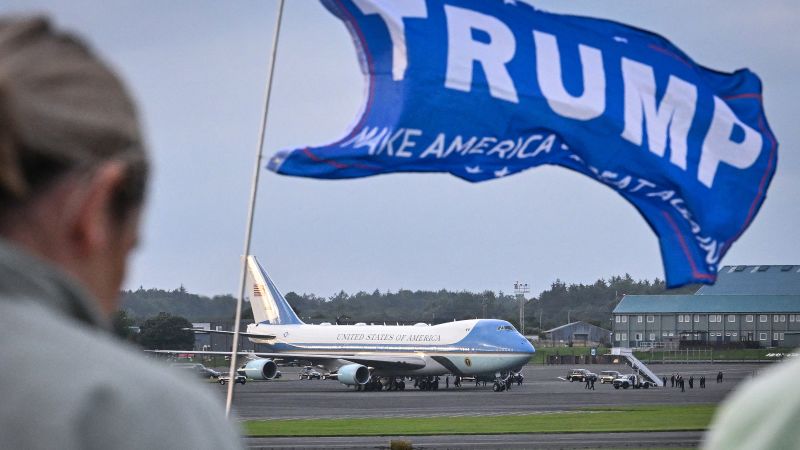In a bid to escape the persistent humidity and mounting controversies in Washington, President Donald Trump has ventured across the Atlantic to Scotland for a five-day working visit. While officially labeled as a ‘working trip’ by the White House, the itinerary appears somewhat relaxed, allowing Trump to engage in social and familiar activities. This visit includes anticipated trade discussions with European Union Chief Ursula von der Leyen on Sunday, and a meeting with British Prime Minister Keir Starmer on Monday, reflecting the international nature of the trip.
During his stay, Trump is set to primarily remain out of public view at two prominent golf resorts he owns: Trump Turnberry, located on the west coast, and Trump International Golf Club further north. Trump, expressing deep emotional ties to Scotland, noted, “We have a lot of things in Scotland… I have a lot of love.” Although leisure golfing occupies much of his schedule, potential demonstrations by protesters threaten to mar the visit, framing the trip as a calm interlude amid a politically turbulent period related to disclosures about the infamous Jeffrey Epstein case, with which Trump has been repeatedly linked.
Questions surrounding Trump’s associations with Epstein have proliferated, leading to intense scrutiny from reporters in recent weeks. Despite the existing political climate, the trip offers Trump a chance to focus on more comfortable subjects such as family, trade agreements, and, of course, golf. His investments in Scotland, particularly the development of luxury golf facilities, have been met with skepticism by local residents, sparking protests during his earlier visits.
A significant part of this trip includes a ceremonial opening of a golf course named the MacLeod Course in Aberdeenshire. This golf course is a tribute to Trump’s late mother, Mary Anne MacLeod, who hailed from the Isle of Lewis. Trump regards this trip as particularly sentimental due to his familial background in Scotland. Local officials have gone to great lengths to prepare security measures for the president, planning what has been described as the largest operation since the passing of Queen Elizabeth II in 2022.
However, Trump’s welcomes in Scotland are not wholly enthusiastic. The National, a prominent Scottish newspaper, ran a boxy headline reading, “Convicted US Felon to Arrive in Scotland,” indicating a less-than-friendly atmosphere. Protests organized by groups like Stop Trump Scotland—aimed at voicing opposition to Trump’s presence and policies—are expected, particularly in cities like Aberdeen and Edinburgh.
Despite these protests, Trump has conveyed excitement about meeting with Scotland’s First Minister John Swinney, whom he described as a “good man.” His meeting with von der Leyen holds weight as both hope to advance discussions on trade relations while contending with escalating tariffs and economic fluctuations in Europe. Trump is optimistic about potential agreements, expressing a 50-50 chance of reaching a trade deal with the EU that could significantly impact transatlantic relations.
Amidst his itinerary—festooned with golf events—Trump’s public appearances are centered on his long-standing interest in securing international trade deals and fostering relationships with foreign leaders. His meeting with PM Starmer seeks to refine trade agreements with the UK and addresses critical topics like military assistance to Ukraine and the humanitarian crisis in Gaza.
Starmer has sought to establish a cordial rapport with Trump, suggesting a prior sour relationship could be mended. Trump’s active participation in international affairs places him at the nexus of significant global issues, despite criticisms of his policies. The planned ceremonial activities including the dedication of the new golf course reflect a dual motive: personal nostalgia for Trump and a professional strategic alignment with British and European leaders.
Trump’s affinity for golf, juxtaposed against a backdrop of political controversies, continues to draw scrutiny and criticism from allies and adversaries alike. His personal investment in golf clubs has sparked conversations not only about his interests but also about the intersection of personal pleasure and public duty. This visit marks a significant moment in Trump’s administration as he navigates the murky waters of political strife and international diplomacy.
Ultimately, Trump’s latest escapade to Scotland reveals the complexities inherent in his presidency—balancing personal proclivities with expectations as a world leader, underscored by the constant visibility and scrutiny that accompany all of his endeavors. Golf may hold significance as a retreat for Trump, but in the eyes of critics, it also serves as a focal point for the enduring questions surrounding his legacy and the lasting impact of his political maneuvers.











